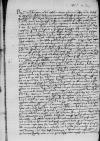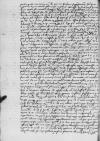Video me erraturum non fuisse, si quod erat in animo bullophorum istum, ut pro communi opera communem stipem acciperet, ad Reverendissimam Dominationem Vestram vacuum transmisissem, ne facerem, cohibitus sum rustico quodam pudore nolens videri lucri captator aut nimis procax in utenda liberalitate Reverendissimae Dominationis Vestrae. Et quis in tanta amicitiae ostentatione et in re probabili deprehendat imposturam? Quod f non difficile tamen fuisset, si contigisset ante mihi legere ⌊⌋, quas nunc ad me Reverendissima Dominatio Vestra misit. Postea ille, cum servitore meo huc suscepto itinere, causatus lassitudinem equi, in taberna substitit neque rediit ad me. veritus, opinor, ne sibi eveniret, quod asino Cumano. Sed valeat cum suo consul cacotechno, cui pro consilio, quid debeam, sciero posthac.
⌊Georgius Hegel⌋ nescio haud scio, an et ipse nobis voluerit prudens imponere, rationem nobis obtrudens, quae minus perspicacem posset facile in ipsius comprobandos calculos abducere ac praedam illi afferre non contemnendam, ut est hoc hominum genus hiantibus corvis non minus offae studiosum. Minutulum videri potest, quod in ratione subducit VII flor(enos) pro 238 aureis Ung(arici)s, quasi non habentibus iustum pondus, cum intelligam mille illos aureos a ⌊consulatu Gedanensi⌋ acceptos electissimi ponderis fuisse, et eos, quos Reverendissima Dominatio Vestra addidit, constet multa superinscribed in place of crossed-out munera and then crossed-out⌈munera multa multa superinscribed in place of crossed-out munera and then crossed-out⌉ pauciores esse, quam ut numerum reiectorum attingant.
Item
q(ui)d(em) or q(uon)d(am) or q(uo)d⌈q(ui)d(em)q(ui)d(em) or q(uon)d(am) or q(uo)d⌉
46 grossos in aureum singulum supputat, hoc grave est, quod 400 ducatos, quos dominus ⌊Theodericus⌋ pro expeditione mea ab heredibus q(uondam) domini ⌊Mauricii⌋ episcopi ex pretio venditarum antiquarum causarum officii notariatus mutuo acceperat, ille calculo suo inserit tamquam a dominis suis acceptos, augens insuper sortem usura 24 ducatorum, cum eius summae nec obolus sit numeratus, quod Reverendissima Dominatio Vestra ex litteris domini Theoderici, quas propterea mitto, evidentissime perspiciet. Et ut Reverendissima Dominatio Vestra rem intelligat. Ego sciens aurum hoc heredum ⌊Romae⌋ esse illis consentientibus scripsi domino ⌊Theoderico⌋, ut quantum ex illo corradere posset, insumeret in meam expeditionem, reliquum sumptuum a ⌊Fucharis⌋ acciperet. Idque propterea, ut vitarem dispendium usurarum, et quo minus ⌊Romae⌋ foret expensum ex meis mille ducatis, hoc plus hic integro numero reciperem, hoc consilio dominus ⌊Theo(dericus)⌋ illos 400 ducatos, quos penes se habebat, iunxit aliis 862 ducatis, quos solos a ⌊Fucharis⌋ accepit complevitque totam expeditionis meae summam ducatis 1262 cum I vel III, non, ut Hegel scribit, ducatis 862. Inveniturque haec mea expeditio excedere expeditionem Reverendissimae Dominationis Vestrae super ecclesia Culmensi in ducatis plus centum, quo auctario explere ingluviem Romanam cogor, ut parum sit a colybistas istos nos undique deglubere.
Scripsit dominus ⌊Theodericus⌋ domino cantori me illos 400 ducatos repositurum esse heredibus, qui iam fortiter per dominum cantorem ceperunt strenue illos a me exigere, pro eisdem convenior idem a ⌊Fucharis⌋, idque cum usura, duos creditores pro uno sortitus. Eam fraudem utcumque ⌊Hegel⌋ simplicitatis praetextu obnubilet, mihi subolet artificium quoddam volentis oculos nostros praestringere. Sed ut concedam esse errorem, quid, quaeso, excusationis habet, quod 50 ducatos, quos procurator noster operae suae mercedem a nobis accepit, Hegel tamquam seorsim illi numeratos subducit in calculis, nec id quidem sine interesse, ut vocant, trium ducatorum, cum dominus Test ⌊Theodericus⌋ in computo mihi misso testetur se XX ducatos stipendi nomine ex mea parte designatos accepisse ex summa 862 ducatorum,  BCK, 1597, p. 24 praeter quos nec teruncium illi pro me ⌊Fuchari⌋ suppeditarunt.
BCK, 1597, p. 24 praeter quos nec teruncium illi pro me ⌊Fuchari⌋ suppeditarunt.
Idem puto et Reverendissima Dominatio Vestra in ratione sibi missa reperiet commissum de suis XXX ducatis hinc certum est rationem ⌊Georgii Hegel⌋, quae nos subductis calculis in 258 florenis Ung(aricis) et grossis 6 1/2 debitores facit, fallere primum in 424 ducat(is), deinde in ducat(is) 53 summa in ducat(is) 477, ut verum sit superinscribed⌈sitsit superinscribed⌉ accepti summam et reliqua sibi constare. Inde clarum est expensi summam non excedere ducatos 1767 grossos 6 1/2. Qua summa subducta ex praeceptorum summa, constat ⌊Fucharos⌋ restare nobi hidden by binding⌈[i]i hidden by binding⌉ debitores in ducat(is) 219 minus gross(os) 6 1/2.
Ego, cum rationem expeditionis Reverendissimae Dominationis Vestrae non vidi, non potui illius omnia excutere. De meis autem mille flo(renis) Ung(aricis) quoniam non plus acceptum est a ⌊Fucharis⌋, quam 914 flore(ni) g(rossi) 3 computato simul hidden by binding⌈[l]l hidden by binding⌉ interesse, manent mihi etiamnum salvi apud Fucharos floreni Ungarici 86 minus hidden by binding⌈[inus]inus hidden by binding⌉ gross(os) 3, quos debeo ab illis recipere, excepto eo, quod mihi Reverendissima Dominatio Vestra superinscribed⌈Dominatio VestraDominatio Vestra superinscribed⌉ voluerit pro sumptu nuntiorum et defectu ponderis auri deducere, haec est mea censura, quam ex ratione illa ⌊Georgii Hegel⌋ cum ceteris collata potui colligere.
Dominatio Vestra Reverendissima dignetur diligentius omnia dispicere, et efficere apud illos malos ratiocinatores, ne quid per iniuriam nostram committatur, utque restituantur quae ex male hidden by binding⌈[ale]ale hidden by binding⌉ deposito auro non sunt insumpta, nam ita convenit inter illos et Reverendissimam Dominationem Vestram hidden by binding⌈[Vestram]Vestram hidden by binding⌉.
Scio dominum cantorem non quieturum reposcendo a me illos 400 aureos, quos putabam me lucrifacturum in illa expeditione. Videbit Reverendissima Dominatio Vestra ex litteris domini ⌊Theoderici⌋, quam vana sit excusatio non concessae gratiae, quia videlicet litterae regiae tardiuscule, hoc est iam facta confirmatione allatae sunt. At post duos menses hidden by binding⌈[s]s hidden by binding⌉ primum litterae sunt expeditae, cum diu iam ante affuisset regia intercessio, et tum primum erat locus petendae gratiae. Unde suspicor conspirasse in hac re eos superinscribed⌈eoseos superinscribed⌉ in hidden by binding⌈[n]n hidden by binding⌉ quos nostram, quorum fide incubuimus, et eo esse actum modo, quo testantur in priori hidden by binding⌈[i]i hidden by binding⌉ Culmen(sis) ecclesiae expeditione actum testantur hi, qui praefuerunt. Sed iam vetus est malum hidden by binding⌈[malum]malum hidden by binding⌉. Ferendam nobis esse Romanae curiae tyrannidem.
Remitto nunc rationes, litteras hidden by binding⌈[s]s hidden by binding⌉ ac omnia ad me missa, item exemplum mitto brevis apostolici, ex quo cognoscet hidden by binding⌈[cet]cet hidden by binding⌉ Reverendissima Dominatio Vestra, quemadmodum habeat negotium consecrationis meae, cuius onus ut suscipere non gravetur, plurimum rogo. Erit in arbitrio Reverendissimae Dominationis Vestrae de hidden by binding⌈[e]e hidden by binding⌉ loco et tempore constituere, de assistentibus non erit difficile statuere. Unum illorum vellem esse dominum ⌊Felicem⌋, illique propterea custodiae possesionem quam primum tradi. Dignetur Reverendissima Dominatio Vestra de his scribere mihi delib<e>rationes suas hidden by binding⌈[s]s hidden by binding⌉, ut ego quoque queam in tempore parare, quae ad rem erunt necessaria. Litteras domini ⌊Theoderici⌋ Reverendissima Dominatio Vestra ad me reddat, quam cupio diutissime salvam et valentem.
Scribit Reverendissima Dominatio Vestra ut, si quid habeam in aula curandum, id ad se scribam. Ego vero iam pridem cupiebam scire, num me Reverendissima Dominatio Vestra commendatum reddiderit domino ⌊Samueli Matzieowski⌋, cui scio agendas a me gratias pro suscepta cura litterarum regiarum pro me, sed neque titulum illius, neque dignitatum appellationes novi, nec scio, quo animo accepturus sit meas litteras. Reverendissima Dominatio Vestra hac vice pro me dignetur facere officium erga ⌊illum⌋, cui certe sum omni officio addictissimus. Consulat, oro, Reverendissima Dominatio Vestra mihi, an iam omnibus videlicet expeditis et ad ⌊regiam maiestatem⌋ scribendum hidden by binding⌈[um]um hidden by binding⌉ aliquid mihi sit. Ego sublatis pristinis patronis illi aulae totus sum peregrinus.
 BCK, 1597, p. 25
BCK, 1597, p. 25
Commendo me favori et benevolentiae Reverendissimae Dominationis Vestrae, quam Deus servet felicem.
Haec dum scriberem, venit ad me ⌊Nicolaus Plotowski⌋ reddens Reverendissimae Dominationis Vestrae ⌊⌋ mihi iucundissimas. Sciebam ⌊illum⌋ venturum, ideo mittere litteras ante nolui, si quid forte praeterea attulisset, de quo esset scribendum.
 BCK, 1597, p. 24 praeter quos nec teruncium illi pro me
BCK, 1597, p. 24 praeter quos nec teruncium illi pro me 


